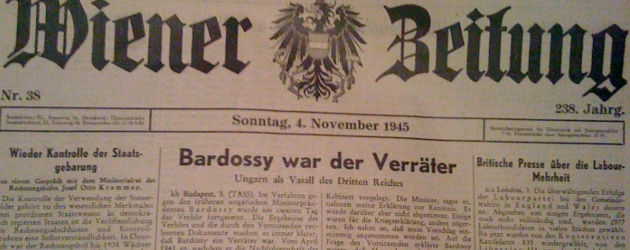Amateur history nerd that I am, I’m quite pleased to have married into a family which has retained all sorts of books, newspapers and magazines dating from about 1920 onwards. The “In the Hausarchiv” series gives an occasional look at the things I’ve come across in our own “house archive”.
Today’s “In the Hausarchiv” features the Sunday, 4 November 1945, edition of the newspaper the Wiener Zeitung. The lead article’s headline reads “Bardossy war der Verräter” (“Bardossy was the betrayer”). It concerns the trial in Budapest of the former Hungarian Prime Minister Laszlo Bardossy, later convicted of war crimes and then executed in 1946.
Reading through the article, I was surprised at how condemnatory it seemed for something written on just the second day of the trial. You can see that from the headline alone, but also within the text, with passages such as “[Bardossy] did everything within his power to quash any remaining vestiges of Hungary’s independence and force it to become a vassal of the Germans.” (My translation.) The article purports to report on Bardossy’s testimony, yet I imagine Bardossy came nowhere near describing his own actions with such self-condemnation.
But of course the tone of the article is not that surprising when we remember that these were still the early months of the occupation of Austria by the Soviets, the Americans, the British and the French. The Soviets, in particular, would have been most interested in portraying a Hungarian fascist in this way. Only later did I realize the byline of the article reads “TASS”, the Soviet news agency. You can see “TASS” in the photo accompanying this entry. I simply didn’t notice it when I first read the article.
One other very short article caught my eye. I assume the article, which is rather anecdotal and offers no information as to the date of its events, describes an event that happened before the end of the war and therefore while the National Socialists were still in power. A certain August Herat, lorry driver, turned down cash and instead accepted 10 sacks of potatoes, 450 kg of peas, and some pork fat for transporting potatoes for Marie Baburek, who owned a stand at the Naschmarkt. During his trip he also received a goose and 6 liters of wine. But bad luck: Ms Baburek decided to snitch on him for this obvious violation of wartime commerce laws. The unlucky Mr. Herat was fined 200 Reichsmark (which is why I assume this occurred during the National Socialist regime — though perhaps the Reichsmark were still in circulation in November 1945 as new currency was awaited?) and sentenced to six months in prison.



